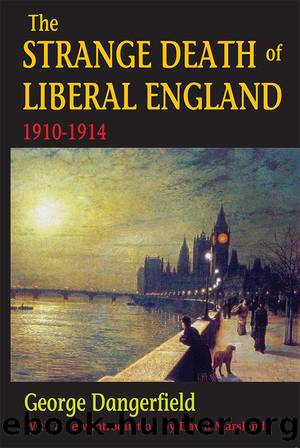The Strange Death of Liberal England by George Dangerfield & David Marsland

Author:George Dangerfield & David Marsland
Language: eng
Format: epub
Publisher: Taylor and Francis
Published: 2017-06-15T00:00:00+00:00
IV
It is impossible to say at exactly what date the doctrine of Syndicalism crept out of France across the English Channel. But it is generally conceded that it made this journey at some time between 1905 and 1910, and James Connolly, the Irish labor leader, is suspected of being responsible for its arrival. The journey was a short one, but it was difficult. Though Syndicalism means nothing more than âTrade Unionismâ in French, it indicated a rather peculiar sort of Trade Unionism, and none the less peculiarâin the eyes of English workmenâfor being French. It advocated the complete supremacy of the Trade Unions, which should federate themselves locally and centrallyâa federation of local unions forming the local Authority, and a standing conference of national representatives of all the Trade Unions forming the National Authority. The producers, in other words, were to control all industries and all services; and they were to gain control through a violent succession of continuous strikes, culminating in a âgeneral expropriatory Strike.â Nothing, of course, could be more opposed to the collectivist theories of the Sidney Webbs, the Fabians, and the socialist members of the I.L.P., who foresaw, through a series of deliberate steps more or less divinely predestined by the Webbs themselves, the gradual evolution of the State into a great organization of consumers; and who, to be sure, are still foreseeing it.
Syndicalism had been a faith full-grown in France since 1902, and it had taken root among the immigrant population of the United States. In France the General Federation of Labor, in America the I.W.W. were in much the same position as the British Trade Unions had been in 1834ââa fearful engine of mischief,â Dr. Arnold had called them in that year, âready to riot or to assassinate.â The Syndicats and the I.W.W. did, in fact, inspire a great deal of terror, nor is it to be supposed that any doctrine they might evolve would be quite so constructive as terroristic. As for the philosophy of Syndicalism, it was rooted in the anarchism of Nietzsche, had branched out into the élan vital of the Bergsonians, and finally come to flower in the Réflexions sur la Violence of M. Sorel.
This strange philosophical growth could notâqua philosophyâhave had the slightest appeal to British workmen. In the first place, they had probably never heard of Nietzsche or Bergson, and as for the Réflexions sur la Violence of M. Sorel they simply would not have understood them: in the second place, they were never very happy with a reasoned system of revolution. And yet, between 1910 and 1914, and against the wishes of their leaders, they plunged into a series of furious strikes which, but for the declaration of War, would have culminated in September, 1914, in a General Strike of extraordinary violence. The exact prescription for a syndicalist revolution.
How could this have come about? Could native thinkers have assisted them, re-stating the propositions of M. Sorel with all the passionate common-sense of the Anglo-Saxon tongue? One glance at the journalism of the day will prove that this could not be the case.
Download
This site does not store any files on its server. We only index and link to content provided by other sites. Please contact the content providers to delete copyright contents if any and email us, we'll remove relevant links or contents immediately.
The Secret History by Donna Tartt(19053)
The Social Justice Warrior Handbook by Lisa De Pasquale(12187)
Thirteen Reasons Why by Jay Asher(8893)
This Is How You Lose Her by Junot Diaz(6877)
Weapons of Math Destruction by Cathy O'Neil(6265)
Zero to One by Peter Thiel(5786)
Beartown by Fredrik Backman(5737)
The Myth of the Strong Leader by Archie Brown(5500)
The Fire Next Time by James Baldwin(5431)
How Democracies Die by Steven Levitsky & Daniel Ziblatt(5215)
Promise Me, Dad by Joe Biden(5141)
Stone's Rules by Roger Stone(5081)
A Higher Loyalty: Truth, Lies, and Leadership by James Comey(4954)
100 Deadly Skills by Clint Emerson(4921)
Rise and Kill First by Ronen Bergman(4779)
Secrecy World by Jake Bernstein(4741)
The David Icke Guide to the Global Conspiracy (and how to end it) by David Icke(4709)
The Farm by Tom Rob Smith(4502)
The Doomsday Machine by Daniel Ellsberg(4484)
